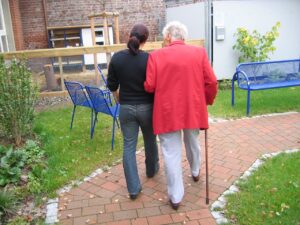
Ensuring that dementia patients receive adequate daily nutrition can pose a challenge for their caregivers. The individual may not want to eat at meal times, forget to eat, or fail to recognize food. They may not remember when or how to eat or what utensils are for. Dementia can also impact the part of the brain that regulates taste and smell, leading to a loss or misinterpretation of these senses or a preference for strong or unusually flavored foods and beverages.
In this month’s Food for Thought, we offer some suggestions to assist caregivers in ensuring that residents with dementia receive the necessary nutrition and hydration, while also making the experience as enjoyable as possible.
Here are some tips to address common eating problems:
- Offer easy-to-chew, bite-sized food for those who don’t like to sit down to eat, may be agitated or distracted, or don’t want assistance.
- Ensure that the food options cover the 5 food groups so there is a variety of nutrients, available during and outside meal times.
- Provide a variety of menu items for those who find it difficult to make choices in advance.
- Allow ample time for meals and offer food frequently instead of waiting for a person to request food.
- When a person is holding a spoon or finger food, gently guide their hand to their mouth (reassuring them if necessary) rather than attempting to feed them.
Understanding each person’s needs:

- Personalize your approach and experiment with different strategies.
- Document what works and what doesn’t, as well as what has been tried for each individual.
- Pay attention to non-verbal cues of likes and dislikes.
Some effective ideas include:
- Using red crockery and contrasting placemats to help identify table items.
- Using menu cards with pictures to help identify food items.
- Offering protein and calorie-rich snacks, available day and night using a snack fridge and fruit bowl for residents who struggle to eat at meal times.
- Allowing residents to eat while walking or wandering.
- Setting up a bar arrangement so people can eat and drink while standing.
- Adding herbs and spices to make meals and snacks more flavorful.
This year’s Dementia Action Week (18–24 September) included World Alzheimer’s Day on Thursday 21 September. The theme for the week was Act Now for a Dementia-Friendly Future. It highlights that communities, including residential aged care communities, that take action to become dementia-friendly experience less fear and promote a greater understanding of dementia.
